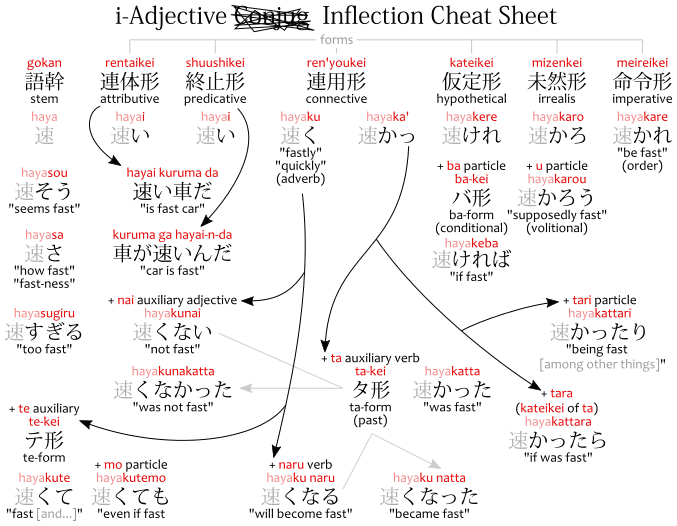

They may predicate sentences and inflect for past, negative, etc. Syntax i-adjectives Īdjectival verbs (形容詞 keiyōshi) end with い i (but never えい ei) in base form. These are generally classed as rentaishi. These are words that were traditionally earlier forms of na-nominals, but that followed a path similar to taru adjectives, surviving in a few cases as fossils. These are a variant of the common na-nominals ( adjectival noun see article for naming) that developed in Late Old Japanese and have mostly died out, surviving in a few cases as fossils they are usually classed as a form of 形容動詞 (adjectival noun), as the Japanese name indicates. taru adjectives (ト・タル形容動詞, to, taru keiyōdōshi, literally "to, taru adjectival noun").

-shii adjectives (form of -i adjectives, see below).For example, ōkina (大きな) "big" (variant of 大きい):Ī couple of small sub-categories can be distinguished in these categories, reflecting former grammatical distinctions or constructions which no longer exist: They are various in derivation and word class, and are generally analyzed as variants of more basic classes, where this specific form (possibly a fossil) can only be used in restricted settings. These may only occur before nouns, and not in a predicative position. attributives ( 連体詞, rentaishi, literally 連 "connects, goes with" + 体 "body", short for 体言 "uninflecting word" such as a noun + 詞 "word").Japanese adjectives that do not fall into either of these categories are usually grouped into a grab-bag category:

According to this analysis, Japanese has no syntactic adjectives. 変な人 ( Hen-na hito) ("a strange person") 彼は変だ。( Kare wa hen da.) ("He is strange.")īoth the predicative forms (終止形 shūshikei, also called the "conclusive form" or "terminal form") and attributive forms (連体形 rentaikei) of adjectival verbs and adjectival nouns can be analyzed as verb phrases, making the attributive forms of adjectival verbs and adjectival nouns relative clauses, rather than adjectives. These can be considered a form of noun in terms of syntax these attach to the copula, which then inflects, but use 〜な -na (rather than the genitive 〜の) when modifying a noun.

The specific problem is: Page is confusing. Screw that, then.This article needs attention from an expert in Japan. However, if you feel the need to put spaces, they more logically should be as follows:Ĭhikai, chikaku nai, chikakatta, chikaku nakattaĬhikai desu, chikaku nai desu (or chikaku arimasen), chikakatta desu, chikaku nakatta desu (or chikaku arimasen deshita).Įdit: Well, I tried to make a full-fledged entry, but this site doesn't allow freaking tables. Of course, I believe it is better to have no space, favoringĬhikai, chikakunai, chikakatta, chikakunakattaĬhikai desu, chikakunai desu (or chikaku arimasen), chikakatta desu, chikakunakatta desu (or chikaku arimasen deshita).
#PRESENT NEGATIVE ADJECTIVES JAPANESE PLUS#
Instead of "chika kunakatta", it should be "chikaku nakatta", because the grammatical construct behind the form is the adverbial form of "chikai" ("chikaku") plus the plain negative past form of "aru" ("nakatta"). The spacing of the romanized words need to be fixed in the example sentences - the current formatting muddies the logic behind the grammar. I changed the information about this entry, because it is not just about the adjective "chikai", but rather about the method of conjugating i-adjectives as a whole.


 0 kommentar(er)
0 kommentar(er)
